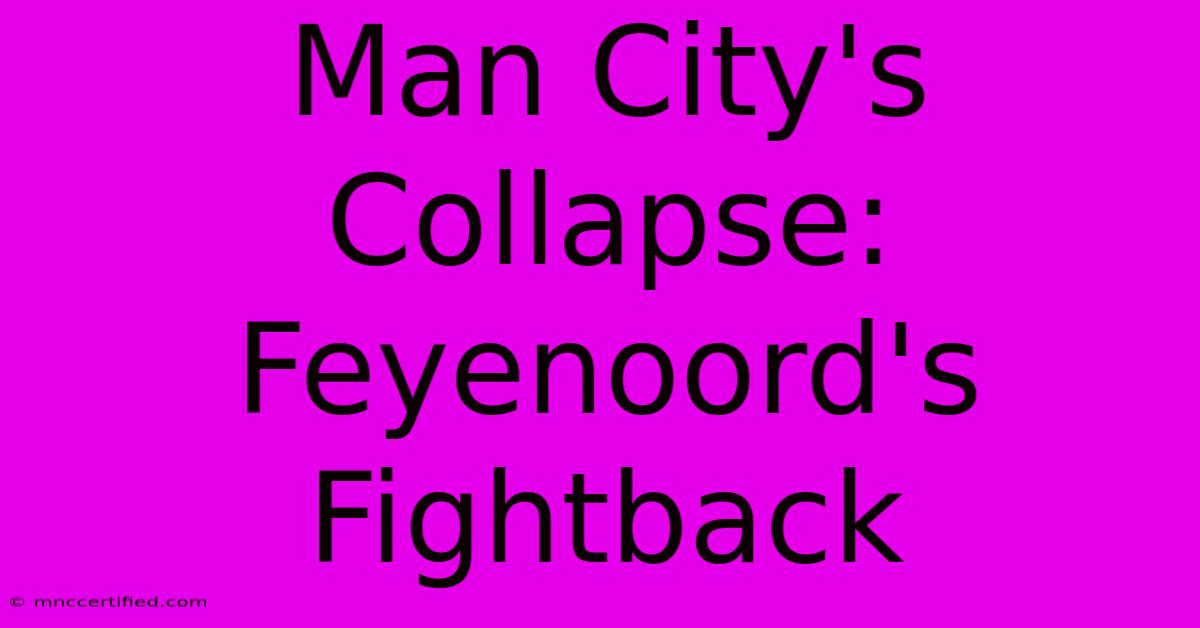Man City's Collapse: Feyenoord's Fightback

Table of Contents
Man City's Collapse: Feyenoord's Stunning Fightback
Manchester City's Champions League campaign took an unexpected turn on October 24th, 2023, as they suffered a shock defeat against Feyenoord in the Netherlands. While City ultimately secured qualification from the group, the manner of their collapse – a stunning fightback from a seemingly insurmountable deficit – has sparked widespread discussion and analysis. This article delves into the key aspects of the match, examining the tactical decisions, individual performances, and broader implications for both teams.
The First Half: City's Dominance
The opening 45 minutes painted a picture of comfortable City dominance. They controlled possession, dictated the tempo, and carved out numerous opportunities. Erling Haaland, as expected, was at the heart of their attack, causing havoc for the Feyenoord defense. City's intricate passing and fluid movement frustrated Feyenoord, who struggled to gain a foothold in the game. A goal from Jack Grealish, showcasing City's superior technical ability, seemed to underline City's inevitable victory.
Tactical Approaches and Early Success
Pep Guardiola's tactical setup emphasized possession and quick, incisive passing. The midfield trio controlled the tempo, allowing City's wingers and fullbacks to exploit the space created. Feyenoord's defensive strategy, while organized, was ultimately overwhelmed by City's superior individual skill and tactical fluidity in the first half. This early success highlighted the gulf in class, at least on paper, between the two teams.
The Second Half: Feyenoord's Resurgence
The second half witnessed a dramatic shift in momentum. Feyenoord emerged with renewed vigor and a more aggressive approach. Their pressing became more intense, forcing errors from City's usually composed defense. The introduction of key substitutes disrupted City's rhythm, while Feyenoord capitalized on defensive lapses.
Feyenoord's Tactical Shift and City's Defensive Fragility
Feyenoord's manager implemented a tactical change, shifting to a more direct and attacking style. This change, coupled with increased intensity and pressing, exposed a vulnerability in City's defense. The goals conceded highlighted a momentary lack of concentration and communication within the City backline – a rare occurrence for a team known for its defensive solidity. This unexpected fragility allowed Feyenoord to seize the initiative and turn the game on its head.
The Final Whistle: Implications and Analysis
The final whistle blew with a scoreline that few predicted before the game. Despite the loss, Manchester City’s overall Champions League campaign remained largely unaffected. However, the manner of the defeat serves as a crucial reminder that even the best teams can be vulnerable.
Lessons Learned for Both Teams
For Manchester City, the match served as a wake-up call. It highlighted the importance of maintaining concentration and defensive discipline for the entire 90 minutes. For Feyenoord, the victory showcased their resilience, tactical flexibility, and ability to compete against the continent’s elite. This stunning upset will undoubtedly boost their confidence and morale moving forward.
Conclusion: An Upset for the Ages
The Feyenoord vs. Manchester City match will be remembered as one of the Champions League's biggest upsets of the season. Feyenoord's stunning fightback, fueled by a tactical shift and increased intensity, exposed a rare vulnerability in City's usually impenetrable defense. While City's overall campaign remained unaffected, the game serves as a reminder that in football, anything is possible. The match highlighted the importance of maintaining focus throughout a game, regardless of opponent or scoreline, a lesson learned by both teams on a memorable night in Rotterdam. The result will undoubtedly go down in Champions League folklore.

Thank you for visiting our website wich cover about Man City's Collapse: Feyenoord's Fightback. We hope the information provided has been useful to you. Feel free to contact us if you have any questions or need further assistance. See you next time and dont miss to bookmark.
Featured Posts
-
Pacific Star Insurance Company
Nov 27, 2024
-
Locate Eloise Sisley Beda Cortland Ohio
Nov 27, 2024
-
This Morning Viewer Outrage Over Controversial Star
Nov 27, 2024
-
Man City Feyenoord 3 3 November 26th
Nov 27, 2024
-
Champions League City Vs Feyenoord
Nov 27, 2024